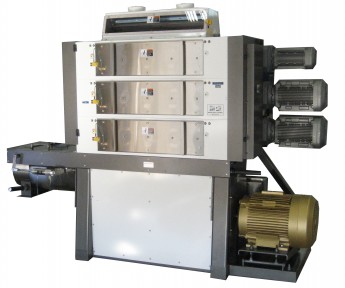There are two major differences between standard coffee grinding machines and industrial coffee grinders, but they both have the biggest impact on a single aspect of your business or company—your bottom line. Industrial coffee grinders lower your overall costs by speeding up the rate at which you’re able to grind coffee while simultaneously improving the quality of the coffee grounds for brewing.
In the long run, it would take more man hours and more mechanic run time to grind out large amounts of coffee with a regular coffee grinder as opposed to an industrial one. Further, the grinding plates and options on an industrial coffee grinder allow you to get a more controlled grind, giving you a higher quality and higher yield of coffee. That means you can sell more coffee thanks to the higher yield and sell it at premium prices thanks to the higher quality ground.

The Quality of an Industrial Coffee Grinder
There is a large amount of control that you can exert over your final product with an industrial coffee grinder. Since coffee grinding is one of the most important steps when it comes to producing a quality cup of coffee, it follows suit that the better the grinding equipment, the better your overall brew is going to be.
Coffee grinding improves the taste, aroma retention and also the overall extraction yield. This means that not only can you sell the cup of coffee for more money thanks to its high potency and supreme taste, but you will also sell more cups per pound of unground coffee beans with an industrial grinder than you would were you to use a standard grinder.
This can be the difference between crushing your competition by having enough coffee on hand to lower your prices, driving them out of business, and having the same done to you. Regardless of what your business strategy, margin or final price point is, having an industrial coffee grinder at your disposal will make your goals easily attainable.
Faster Production for Greater Profit
The main advantage here is that you can grind out thousands of pounds of coffee per hour with an industrial grinder, with it also being of the highest quality. For around the clock coffee grinding operations, roller mill grinders are ideal since they are able to crank out high volumes of coffee at a grueling pace. Of course, if cost is your concern, flat disc grinders can also get the job done, often at just one-fourth of the price of a roller mill grinder. Then again, this is really only an option for those looking to produce up to 1,000 pounds of coffee each hour (and not necessarily around the clock).
On the upside, disc grinders are generally easier to maintain, being both quicker and cheaper to service and upkeep. With roller mill grinders, you’ll likely have to have a skilled technician should there be any problems, but the overall durability of roller mill industrial grinders give them a huge advantage for large scale operations. It should also be noted that steel discs wear down a lot more easily when the coffee hasn’t been cleaned—that is to say, filtered for rocks, sand, dirt and other debris—but do well with clean coffee.
Quality Equipment for Quality Coffee
Either way, it’s important to keep in mind that whichever type of industrial grinder you decide to go with, the key to having a successful operation is limiting downtime to almost non-existent levels. Any stoppage of production can have a significant impact on the overall product availability and ultimately, profit margins. In order to ensure there is no downtime, you need a quality industrial coffee grinder.
Author Bio – Mark, the author of this article writes on behalf of Modern Process Equipment (MPE) Chicago leaders in invention, development and manufacture of advanced processing equipments, grinders, conveyors etc. If you’re on the lookout for the most sophisticated and reliable commercial industrial coffee grinders to minimize your exposure to downtime and increase your returns on investment, do get in touch with MPE Chicago today for more details.
